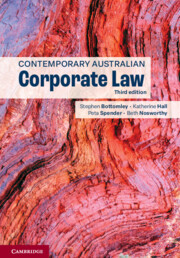Refine search
Actions for selected content:
363 results
4 - How to Tame the ‘Digital’ Shrew
- from Introduction to Part I
-
-
- Book:
- Human Rights in the Digital Domain
- Published online:
- 24 October 2025
- Print publication:
- 13 November 2025, pp 58-82
-
- Chapter
-
- You have access
- Open access
- HTML
- Export citation
1 - “In the Shadow of the Vatican”
-
- Book:
- In the Shadow of the Vatican
- Published online:
- 23 October 2025
- Print publication:
- 06 November 2025, pp 14-59
-
- Chapter
- Export citation
Conclusions
-
- Book:
- In the Shadow of the Vatican
- Published online:
- 23 October 2025
- Print publication:
- 06 November 2025, pp 205-218
-
- Chapter
- Export citation
12 - The British–Irish Negotiations on the Drafting of the 1922 Constitution of the Irish Free State
-
-
- Book:
- Law and Constitutional Change
- Published online:
- 26 September 2025
- Print publication:
- 16 October 2025, pp 216-236
-
- Chapter
-
- You have access
- Open access
- HTML
- Export citation
9 - Land Rights of Indigenous Peoples in the Democratic Republic of Congo
- from Part III - Africa and Asia
-
-
- Book:
- Land Rights Now
- Published online:
- 06 September 2025
- Print publication:
- 25 September 2025, pp 187-205
-
- Chapter
-
- You have access
- Open access
- HTML
- Export citation
12 - Adivasis and Land Rights in India
- from Part III - Africa and Asia
-
-
- Book:
- Land Rights Now
- Published online:
- 06 September 2025
- Print publication:
- 25 September 2025, pp 249-279
-
- Chapter
-
- You have access
- Open access
- HTML
- Export citation
13 - Legal Privileges and the Effective Recognition of Indigenous Land Rights
- from Part III - Africa and Asia
-
-
- Book:
- Land Rights Now
- Published online:
- 06 September 2025
- Print publication:
- 25 September 2025, pp 280-309
-
- Chapter
-
- You have access
- Open access
- HTML
- Export citation

Contemporary Australian Corporate Law
-
- Published online:
- 11 September 2025
- Print publication:
- 25 September 2025
-
- Textbook
- Export citation
1 - From Confederation to Constitution
-
- Book:
- The Nation at Sea
- Published online:
- 28 August 2025
- Print publication:
- 11 September 2025, pp 13-44
-
- Chapter
- Export citation
Epilogue
- from Part III - Courts for a New Empire, 1816–1825
-
- Book:
- The Nation at Sea
- Published online:
- 28 August 2025
- Print publication:
- 11 September 2025, pp 266-278
-
- Chapter
- Export citation
EMBEDDEDNESS, POLICYMAKING, AND THE DYNAMIC CONSTITUTION: WHICH WAYS AHEAD?
-
- Journal:
- National Institute Economic Review ,
- Published online by Cambridge University Press:
- 01 September 2025, pp. 1-9
-
- Article
-
- You have access
- Open access
- HTML
- Export citation
2 - An Overview of Intellectual Property
- from Part I - Background on AI and IP
-
- Book:
- AI versus IP
- Published online:
- 09 August 2025
- Print publication:
- 28 August 2025, pp 31-40
-
- Chapter
- Export citation
Path dependence and political bargaining in the elaboration of contents of authoritarian constitutions: the Portuguese Constitution of 1933
-
- Journal:
- European Law Open ,
- Published online by Cambridge University Press:
- 22 August 2025, pp. 1-15
-
- Article
-
- You have access
- Open access
- HTML
- Export citation
INTRODUCTION: THE CONSTITUTION OF POLITICAL ECONOMY
-
- Journal:
- National Institute Economic Review ,
- Published online by Cambridge University Press:
- 20 August 2025, pp. 1-4
-
- Article
-
- You have access
- Open access
- HTML
- Export citation
Chapter 10 - Freedom, Willing Servitude, and the Limits to Autonomy in Plato’s Laws
- from Part V - Reconciling between Freedom, External Authority, and Nature
-
-
- Book:
- Platonic Autonomy
- Published online:
- 07 August 2025
- Print publication:
- 31 July 2025, pp 216-234
-
- Chapter
- Export citation
Chapter 4 - International and municipal law
-
- Book:
- International Law
- Published online:
- 26 July 2025
- Print publication:
- 31 July 2025, pp 180-244
-
- Chapter
- Export citation
17 - From Bloggers in Pajamas to the Gateway Pundit
- from Part V - Identifying Performers of the Press Function
-
-
- Book:
- The Future of Press Freedom
- Published online:
- 25 July 2025
- Print publication:
- 24 July 2025, pp 271-297
-
- Chapter
-
- You have access
- Open access
- HTML
- Export citation
Reconciling Constitutional Values in Ghana Through Purposive Interpretation
-
- Journal:
- Journal of African Law , First View
- Published online by Cambridge University Press:
- 23 June 2025, pp. 1-22
-
- Article
-
- You have access
- Open access
- HTML
- Export citation
Dignity as humanness: a pathway to understand the place of dignity as a constitutional end
-
- Journal:
- International Journal of Law in Context / Volume 21 / Issue 3 / September 2025
- Published online by Cambridge University Press:
- 02 June 2025, pp. 514-532
-
- Article
-
- You have access
- Open access
- HTML
- Export citation
Legal Strategies Countering Federal Public Health Data Purges
-
- Journal:
- Journal of Law, Medicine & Ethics / Volume 53 / Issue 2 / Summer 2025
- Published online by Cambridge University Press:
- 26 May 2025, pp. 327-330
- Print publication:
- Summer 2025
-
- Article
-
- You have access
- Open access
- HTML
- Export citation
